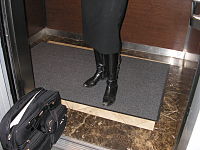- Midras uncleanness
-
Part of Judaic series of articles on Ritual purity in Judaism 
Tumah and taharah · Mikveh Purification methodsHierarchyAv HaTumahWoman in niddah state standing on elevator rug using her full body weight, thereby rendering the rug a "midras tmeiah" (unpure midras)
The term midras uncleanness (טומאת מדרס) or pressure uncleanness[1] is used for uncleanness transmitted by either an object or person in Judaism.
In terms of ritual purity in Judaism a midras (lit. "trampled on" object) is a Hebrew term used to denote an object that can be a carrier of ritual impurity. Common objects that could potentially become unclean, and become a such midras object, include a chair, sofa, mattress, and rug. Once a person becomes unclean, he or she is categorized as a "father of uncleanliness".
Contents
Hebrew Bible
The general concept of a midras, an object becoming a carrier for uncleanliness, is brought in the book of Leviticus, though the following verse does not employ the Hebrew term midras;
And he that sitteth on [any] thing whereon he sat that hath the issue shall wash his clothes, and bathe himself in water, and be unclean until the even.—Leviticus 15:5, KJV 1611Becoming unclean
According to Maimonides on Zavim 4:4, the midras object becomes unclean by a person who is a "father of uncleanliness" (such as a man with a seminal emission a woman in the middle of menstruation) putting most of their body weight in one (or more) of five ways on the midras;
- sitting on the midras like a chair
- lying on the midras like a rug
- leaning on the midras
- standing on the midras like a mat
- hanging from the midras
Transmitting uncleanliness
Once the midras becomes unclean, it transmits uncleanliness to clean persons or objects by one of seven ways;
- by touching the midras
- by carrying the midras
- by sitting on the midras
- by lying on the midras
- by leaning on the midras
- by standing on the midras
- by hanging from the midras
The person or object who becomes unclean via the midras is categorized as a Rishon L'Tumah.
Purification
The purification of the midras object is accomplished by immersing the object in a bath (before sunset), and the subsequent elapse of sunset.
Disqualified objects
Objects that are not subject to becoming unclean as midras include;
- Unformed plates of Terracotta,
- Any object or vessel of stone,
- Fabric or vessels made from fish (or any sea-life)
- Objects or vessels affixed to the ground
References
- ^ Jacob Neusner (2005). Is Scripture the origin of the Halakhah?. p. 141. "The pertinent classification of uncleanness called Midras- or pressure-uncleanness pertains only to objects that ordinarily are used to bear weight or pressure, that is, beds and chairs and things analogous to them"
Categories:- Judaism stubs
- Jewish ritual purity law
Wikimedia Foundation. 2010.

